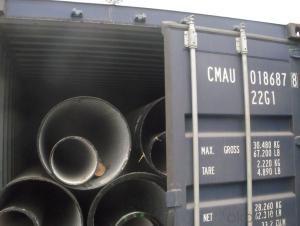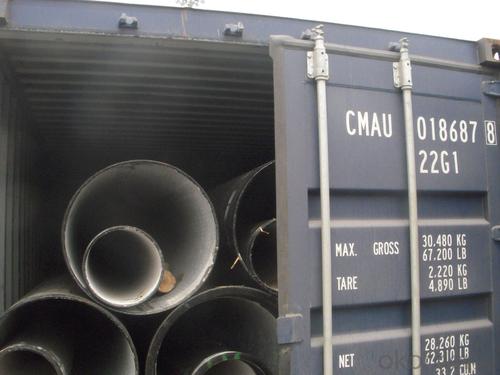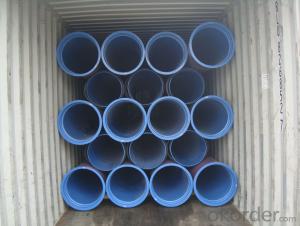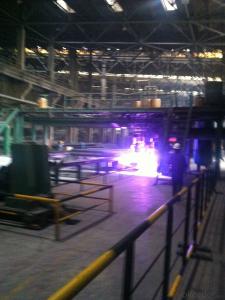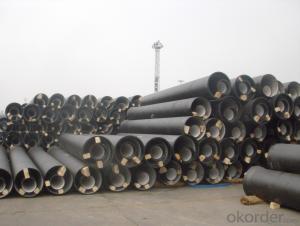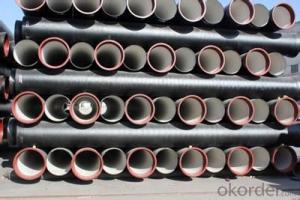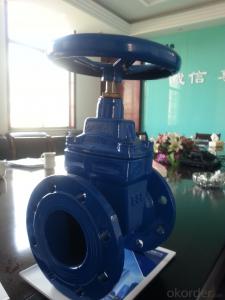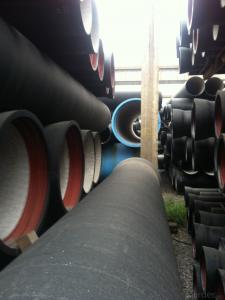DUCTILE IRON PIPES AND PIPE FITTINGSk8 CLASS DN1700
- Loading Port:
- Tianjin
- Payment Terms:
- TT OR LC
- Min Order Qty:
- 22 pc
- Supply Capability:
- 3000 pc/month
OKorder Service Pledge
OKorder Financial Service
You Might Also Like
Material : Ductile Cast Iron
Size Range : DN 80mm to DN 2000mm
Unit Effective Length : 6m or 5.7m
Manufacture Standard: ISO 2531:1998/ EN 545:2006/EN 598:2007
Annual capacity : 200,000 tons
Coating Exterior: Zinc 130g/m2 according to ISO 8179-1 and bitumen coating 70 microns.
Cement Interior: Portland Cement/ High Alumina Cement/ Sulphate Resisting Cement Lining according to ISO 4179
Special requirements on external coating and internal lining can be applied
We also provide accessories such as SBR/EPDM rubber gaskets, lubricant paste, pipe caps, PE sleeves, etc.
Additional Parts:
Each pipe is strictly inspected according to related standard to ensure permanently high performance.
Easy Installation at site and service free for life
Long Service Lifespan
Quotation will arrive you within 24hours once we get your inquiry.
We guarantee offering you a competitive price.
A copy of original inspection reports of pipes will be offered after shipment.
Photos of loading process will be sent to the customer after shipment effect.
We will follow-up the delivery progress after shipment effect and update to the customer on weekly basis.
- Q: Can ductile iron pipes be used for underground fuel storage systems?
- Yes, ductile iron pipes can be used for underground fuel storage systems. Ductile iron is a type of cast iron that possesses superior strength, durability, and flexibility compared to traditional cast iron pipes. These properties make ductile iron pipes suitable for various applications, including underground fuel storage systems. Ductile iron pipes are resistant to corrosion, which is essential for underground storage systems that may come into contact with various fuels and chemicals. Additionally, their high tensile strength and resilience allow them to withstand external pressure and loading, ensuring the integrity and safety of the underground storage system. Furthermore, ductile iron pipes have a long lifespan, typically lasting for several decades, making them a cost-effective choice for underground fuel storage systems. They can handle the weight of the stored fuel and any potential ground movements, maintaining the structural integrity of the system over time. However, it is important to note that the suitability of ductile iron pipes for underground fuel storage systems may also depend on other factors, such as local regulations, soil conditions, and the specific fuel being stored. It is always recommended to consult with professionals and adhere to applicable guidelines when designing and installing such systems to ensure compliance and safety.
- Q: Can ductile iron pipe be used for hot water applications?
- Yes, ductile iron pipe can be used for hot water applications. Ductile iron pipe is known for its strength, durability, and high resistance to corrosion, which makes it suitable for a wide range of applications, including hot water systems. It can handle high temperatures and pressure, making it a reliable choice for transporting hot water. Additionally, ductile iron pipe's thermal conductivity properties allow for efficient heat transfer, ensuring that hot water is delivered effectively throughout the system. Therefore, when considering materials for hot water applications, ductile iron pipe is a suitable option.
- Q: What is the expected hydraulic efficiency of ductile iron pipes?
- Several factors, including pipe diameter, roughness of the pipe surface, flow rate, and length of the pipe, can affect the expected hydraulic efficiency of ductile iron pipes. However, it is generally acknowledged that ductile iron pipes exhibit exceptional hydraulic efficiency. Ductile iron pipes possess an inner surface that is smooth, thereby reducing frictional losses and facilitating efficient water flow. The smoothness of the pipe surface serves to minimize energy losses caused by turbulence and resistance. Furthermore, ductile iron pipes are engineered to maintain a consistent and uniform internal diameter, which further enhances their hydraulic efficiency. Research has demonstrated that hydraulic efficiencies of ductile iron pipes can range from 85% to 95%. This indicates that a significant portion of the energy inputted into the system is effectively transferred to the water, resulting in minimal losses. It should be noted that the hydraulic efficiency of ductile iron pipes can be influenced by factors like corrosion, scaling, and sediment accumulation over time. Regular maintenance and appropriate cleaning procedures can help preserve the hydraulic efficiency of ductile iron pipes. In summary, ductile iron pipes are widely regarded for their high hydraulic performance and are extensively utilized in water distribution systems due to their ability to convey water with minimal energy losses.
- Q: How long does the cast iron pipe of indoor direct buried sewage need to be examined?
- UPVC, also called hard PVC, is an amorphous thermoplastic resin made by polymerization of vinyl chloride monomer, with certain additives (such as stabilizers, lubricants, fillers, etc.). In addition to additives, the method of blending with other resins is also applied to make it have obvious practical value. These resins are CPVC, PE, ABS, EVA, MBS and so on. UPVC has high melt viscosity and poor flowability. Even if the pressure and melt temperature are increased, the fluidity is not changed. In addition, the molding temperature of the resin is very close to the thermal decomposition temperature, and the molding temperature range is very narrow. It is a difficult material to be formed.
- Q: How to correctly measure ductile iron pipe
- This need to find the right tools, Michi, caliper, amount to ductile pipe and pipe fittings and pipe fittings of the outer diameter, inner diameter, length and wall thickness were measured, eleven.
- Q: Ductile iron and gray iron is what are the advantages and disadvantages of it
- Comparison of ductile iron and cast iron (gray iron)Compared with cast iron, ductile iron has an absolute advantage in strength. The tensile strength of ductile iron is 60K, while the tensile strength of cast iron is only 31k. The yield strength of ductile iron is 40K, while the cast iron does not show yield strength, and eventually breaks. The strength to cost ratio of ductile iron is far superior to that of cast iron. Ductile iron is the same as cast iron in corrosion resistance.
- Q: Can ductile iron pipes be used for fire protection systems?
- Fire protection systems can utilize ductile iron pipes. Ductile iron, a form of cast iron, possesses both strength and flexibility, making it suitable for various applications, including fire protection systems. It boasts excellent mechanical properties, such as high tensile strength and impact resistance, which are essential for withstanding the pressures and stresses that can arise during fire suppression efforts. Ductile iron pipes are renowned for their durability and long lifespan, which is crucial for reliable and functional fire protection systems. They have a longer lifespan compared to materials like PVC or galvanized steel and are less susceptible to corrosion. This is particularly important for fire protection systems, as they must remain operational even after extended periods of inactivity. Additionally, ductile iron pipes exhibit exceptional fire resistance. They can withstand high temperatures without compromising their structural integrity, ensuring the fire protection system remains intact and functional during fire emergencies. This is pivotal for ensuring the safety of occupants and minimizing property damage. Furthermore, ductile iron pipes are compatible with a wide range of fittings, valves, and accessories commonly used in fire protection systems. This facilitates easy installation and integration into existing fire suppression networks. In conclusion, ductile iron pipes are a reliable and suitable choice for fire protection systems due to their strength, durability, fire resistance, and compatibility with other system components.
- Q: How does ductile iron pipe perform in extreme weather conditions?
- Ductile iron pipes are renowned for their exceptional performance in adverse weather conditions. These pipes demonstrate remarkable durability, resistance, and flexibility, making them suitable for enduring harsh weather such as extreme temperatures, heavy rainfall, snowfall, and even earthquakes. One of the notable characteristics of ductile iron is its capacity to withstand damage caused by freezing temperatures. Unlike other materials, ductile iron pipes possess a low coefficient of thermal expansion, enabling them to resist the expansion and contraction that occurs during freeze-thaw cycles without experiencing cracks or breaks. Consequently, these pipes remain intact and continue to function optimally even in extremely cold conditions. Furthermore, ductile iron pipes exhibit excellent resistance to corrosion, rendering them highly resilient to the corrosive effects of severe weather. They are shielded by a sturdy zinc coating, which acts as a barrier against rust and other forms of corrosion. This coating, in conjunction with the inherent strength of ductile iron, grants these pipes exceptional resistance to the corrosive effects of rain, snow, and moisture. Moreover, ductile iron pipes possess superior flexibility, allowing them to accommodate ground movement and seismic activity. In areas prone to earthquakes or soil shifting, these pipes can absorb stress and strain without fracturing, guaranteeing a continuous supply of water and sewage services even in the most challenging weather conditions. Overall, ductile iron pipes excel in extreme weather conditions due to their durability, resistance to freezing, corrosion, and flexibility. Their ability to withstand the elements ensures an uninterrupted supply of water and sewage systems, providing reliability and peace of mind to utility providers and communities, even in the most unforgiving environments.
- Q: Are ductile iron pipes resistant to environmental stress cracking?
- Yes, ductile iron pipes are highly resistant to environmental stress cracking.
- Q: Can ductile iron pipes be used for marine applications?
- Yes, ductile iron pipes can be used for marine applications. Ductile iron has excellent corrosion resistance properties, making it suitable for use in marine environments where exposure to saltwater and other corrosive elements is common. Additionally, its high strength and durability make it a reliable choice for various marine applications such as seawater intake and discharge systems, offshore platforms, and marine pipelines.
Send your message to us
DUCTILE IRON PIPES AND PIPE FITTINGSk8 CLASS DN1700
- Loading Port:
- Tianjin
- Payment Terms:
- TT OR LC
- Min Order Qty:
- 22 pc
- Supply Capability:
- 3000 pc/month
OKorder Service Pledge
OKorder Financial Service
Similar products
Hot products
Hot Searches
Related keywords
